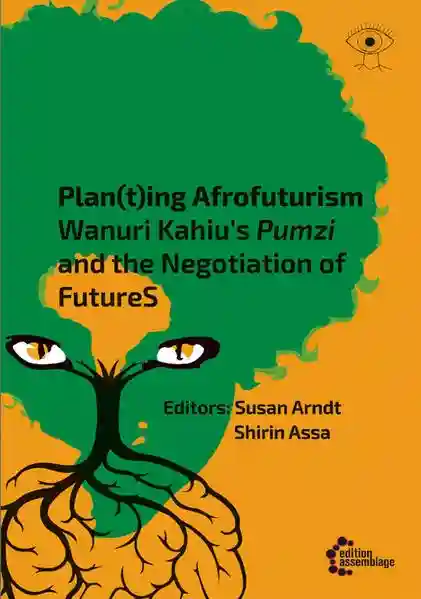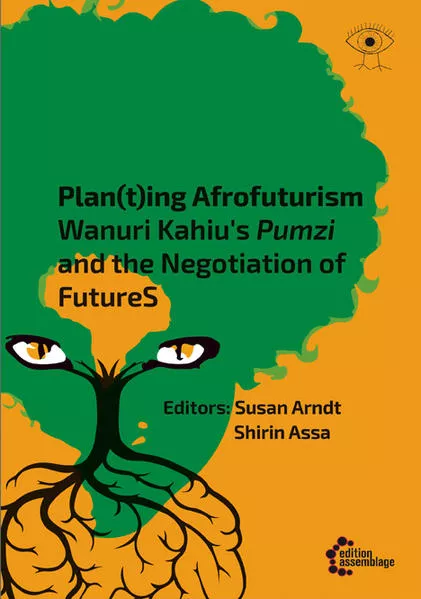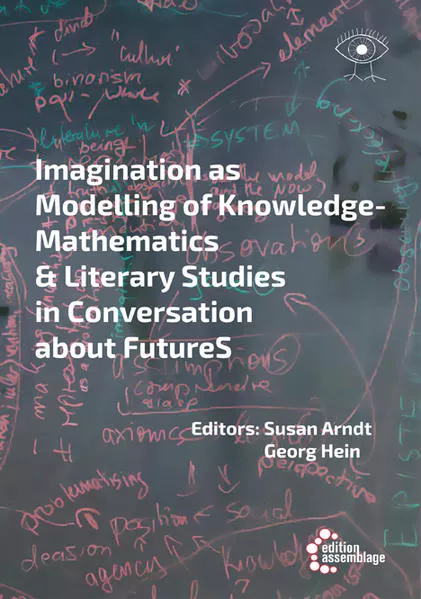Chronologie aller Bände (1 - 2)

Die Reihenfolge beginnt mit dem Buch "Plan(t)ing Afrofuturism". Wer alle Bücher der Reihe nach lesen möchte, sollte mit diesem Band von Susan Arndt beginnen. Die Reihe umfasst derzeit 2 Bände. Der neueste Band trägt den Titel "Imagination as Modelling of Knowledge".
- Anzahl der Bewertungen für die gesamte Reihe: 0
- Ø Bewertung der Reihe: 0
- Band: 3
- Autor: Arndt, Susan
- Anzahl Bewertungen: 0
- Ø Bewertung:
- Medium: Buch
- Veröffentlicht: 01.01.2023
- Genre: Politik
Plan(t)ing Afrofuturism
Wanuri Kahiu’s "Pumzi" is an Afrofuturist movie, addressing the consequences of climate change and subsequent wars. "Pumzi" disturbs to dream, turning memory into the elixier of future. This volume is dedicated to learning from Pumzi and its protagonist Asha. Solidarity and resistance in the midst of a dystopic technodictatorship plan(t) new futureS, across species and time. This volume’s contributions delve into this topic pillared on concepts such as futureS, hero, dystopia, Afrofuturism, environment and solidarity. In doing so, the volume contributes to contouring the emergent field Postcolonial Posthuman Studies.
- Band: 4
- Autor: Arndt, Susan
- Anzahl Bewertungen: 0
- Ø Bewertung:
- Medium: Buch
- Veröffentlicht: 01.12.2023
- Genre: Politik
Imagination as Modelling of Knowledge
Mathematik und Literaturwissenschaft im Dialog? Genau darin übt sich der vorliegende Band. Er zeigt, dass beide Disziplinen miteinander reden, weil sie es können; und sie können es, weil sie sich verschieden und doch ähnlich an dem orientieren, was die Welt im Innersten zusammenhält. Nicht obwohl, sondern weil Mathematik sich an der Realität orientiert, operiert sie mit Metaphern, die aus dem Leben gegriffen sind. Literatur wiederum ist alles andere als eine bloße Erfindung. Sie entbrennt aus den spannenden Wogen ihrer Zeit, ja, ist Teil eben dieser; und die LiteraturWissenschaft tut eben dies ihr gleich. Und eben weil beide Disziplinen, die Mathematik und die Literaturwissenschaft, als LebensWissenschaften mitten aus diesem (planetarischen) Welt-Sein heraus sprechen, weisen sie Überlappungen auf. Diese Einheit in der Vielfalt macht Dialoge nicht nur möglich, sondern sogar fruchtbar. Eben daraus wurde der in diesem Buch geführte interdisziplinäre Dialog geboren. Im Zentrum dieses Dialoges steht die These, dass Imagination nicht nur die Literatur und deren Wissenschaft beflügelt, sondern ebenso auch Erwägungen und Erörterungen der Theoretischen Mathematik. Gravitationswellen, Raumzeit, Schwarze Löcher – was wir heute darüber zu wissen glauben, begann mit Vorstellungskraft: der Kraft, sie sich vorstellen, sie imaginieren, zu können. Die Fähigkeit, zu sehen, was nicht zu sehen war, also sie zu imaginieren, ebnete den Weg dafür, sie vermittels von Algorithmen, Topologien und Modellen verstehen zu können. Andersherum lebt die Wissenschaft, die sich den Imaginationen widmet, die Literaturwissenschaft also, davon, TextWelten als Algorithmen, Topologien und Modelle planetarischer Begegnungen verstehen zu können. Und im Prozess des Modellierens und Analysierens arbeiten beide Disziplinen wiederum mit Prismen und Konzepten, die sich kennen und überlappen: Singularität, Multiplizität, Schmetterlingseffekt, Wellen. Kurzum: Das Buch lädt dazu ein Imagination als Wissen zu verstehen; und Wissen als Imagination.

